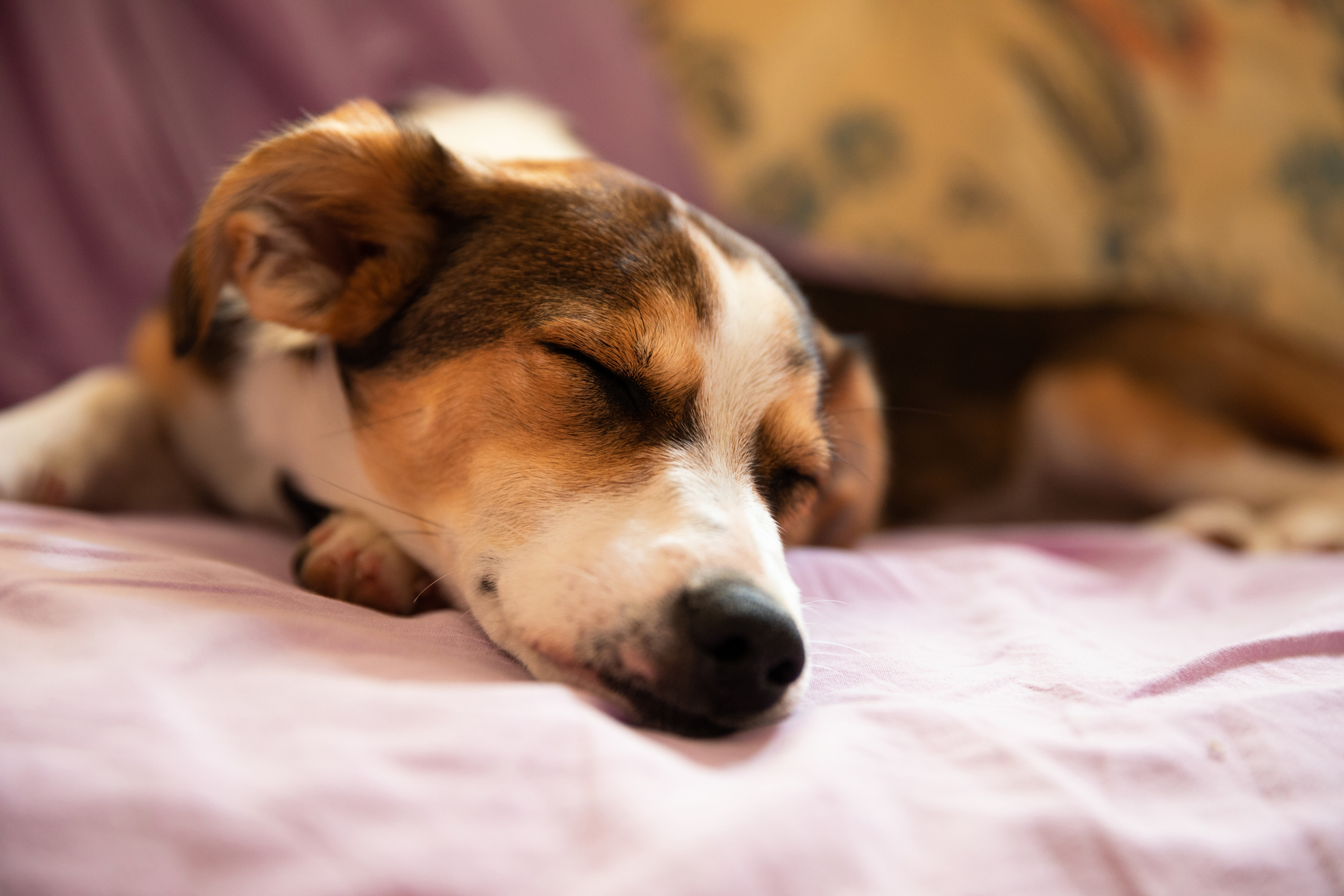How Much Do Dogs Sleep? Decoding Your Dog’s Sleep Cycle
Doctor of Veterinary Medicine

While efforts are made to answer all questions as quickly as possible, if an immediate answer is required or if your pet is in need of urgent or emergency care, contact your pet's veterinarian immediately.
Doctor of Veterinary Medicine

You will receive an answer from Dr. Lindsay and our vet/tech team as soon as possible, usually the same day.
All answers are provided for informational or educational purposes only, and are intended to be a supplement to, and not a substitute for, the expertise and professional judgment of your pet's veterinarian.
It may be necessary to consult your pet's veterinarian regarding the applicability of any opinions or recommendations with respect to your pet's symptoms or medical condition.
CloseDoctor of Veterinary Medicine

An error has occurred, please reload the page and try again.
CloseDoctor of Veterinary Medicine

While efforts are made to answer all questions as quickly as possible, if an immediate answer is required or if your pet is in need of urgent or emergency care, contact your pet's veterinarian immediately.
There is no answer related to your question

By adulthood, most dogs sleep through the night. Still, you might notice that your dog takes several naps throughout the day, sighing deeply as though they’ve worked a double shift.
Have you ever wondered why dogs sleep so much? As it turns out, it has nothing to do with laziness and everything to do with your dog’s innate survival instincts.
How Many Hours Do Dogs Sleep Each Day?
Dogs usually sleep at least 11 hours, and up to 20 hours throughout the day. Puppies and senior dogs tend to sleep the most, while young adult dogs are usually more active. Your dog’s breed and size matter, too. Larger dogs usually sleep more compared to small breeds.
Like humans, dogs are diurnal. Most of their sleep takes place through the night, while the remainder is usually split up across a few naps throughout the day.
Your Dog’s Sleep Cycle
Even though dogs sleep at night like us, their sleep cycle is quite different.
A human’s sleep cycle lasts about 100 minutes, and we typically have about four to five cycles throughout the night, spending about 25% of that time in rapid-eye movement (REM) deep sleep phases.
In contrast, a dog’s sleep cycle lasts just 45 minutes, and only 10% consists of deep REM sleep. Since REM sleep is essential to healing, cognitive function, and immunity, dogs make up for short sleep cycles by sleeping more throughout the day.
Short REM periods make it possible for dogs to instantly wake up and become alert at any sign of danger. That’s why your dog gets up ready to play, eat, and go outside - no grogginess, no morning coffee needed to get their day started.
But that also means that when dogs enter REM, they sleep hard. Some dogs are active dreamers, and you’ll know when they’ve entered that deep sleep phase because they may kick, run, or even bark in their sleep.
Keep in mind that it’s not always obvious when a dog is experiencing REM. Even gentle, well-trained dogs can be grumpy and may even bite if suddenly woken up from REM sleep.
Your Dog’s Eat-Potty-Sleep Cycle
Most dogs can adjust to their family’s sleep schedule, going to bed around the same time and staying asleep until their human is awake.
But some dogs wake up in the middle of night needing to go outside. Puppies, in particular, can have a hard time staying asleep.
If your dog wakes you up to go outside, or if they have accidents overnight, you can train your dog to sleep through the night by adjusting their eat-potty-sleep schedule.
A dog has a short digestive system. It only takes about twelve hours for a meal to go through their digestive tract from start to finish. In comparison, it takes humans about 1-3 days to digest food.
That means if your dog eats dinner around 4 PM, they’ll likely need to go outside at about 4 in the morning. By shifting to a later dinner, you can get your dog to sleep in a few more hours.
Also, keep in mind that dogs tend to need to poop about 30 minutes after eating. This is not the exit of the meal they’ve just eaten, rather, it’s their gastrocolic reflex kicking in as their meal from 12 hours earlier makes its final journey.
If your dog eats a late dinner, you’ll want to make sure they go outside before bedtime. Then, they’re likely to be able to sleep through the night without going out again.
When Your Dog Sleeps More Than Usual
It’s normal and healthy for your dog’s sleeping habits to change throughout their lifetime. Seasonal changes, changes in their feeding schedule, daylight savings, growth spurts, anxiety, and exercise can all influence how much your dog sleeps each day.
Excessive sleeping in senior dogs is often dismissed as slowing down due to old age. Older dogs do sleep a bit more, but any unexplained change in their sleeping habits should be brought up to your veterinarian. Also note that insomnia, night wakefulness, and vocalizing at night can be a sign of canine cognitive dysfunction, a type of dementia that’s common in senior dogs.
For dogs of any age, suddenly sleeping more than usual could be a sign of an underlying health issue. Endocrine issues, heart disease, and depression are a few reasons a dog might suddenly start sleeping a lot. If you notice any unexplained changes in your dog’s sleeping habits or energy level, talk to a veterinarian as soon as possible.
 Swipe
Swipe


















